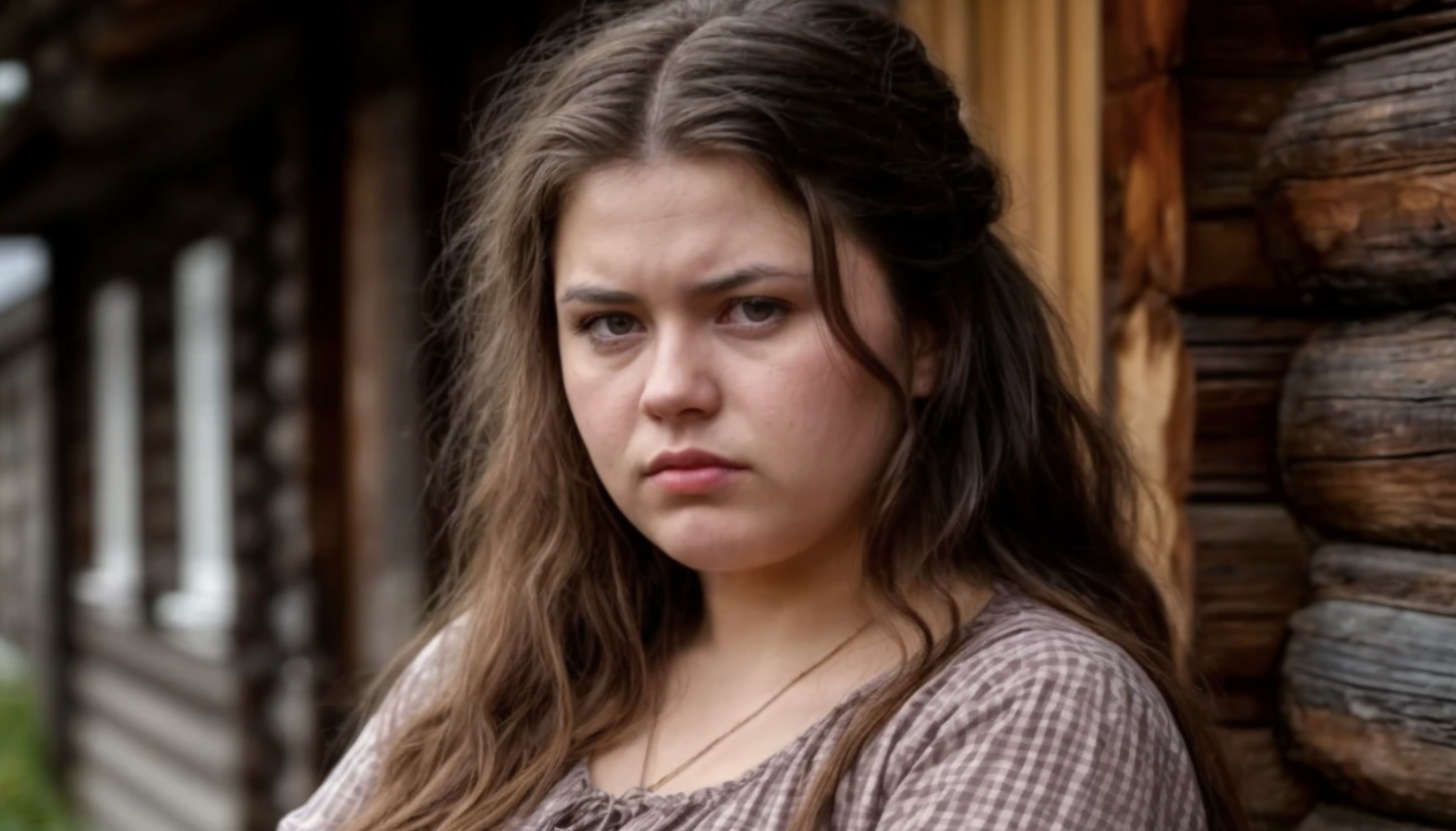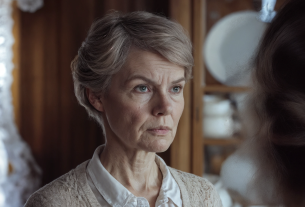As her grandmother used to tell her, Veronika’s father had disappeared from the village long before she was born. And her mother died after enduring a severe illness that claimed the life of the young woman in just a few months. Thus, the only close relative who took on the care of the girl was Maria Evgenyevna.
Her grandmother loved Veronika with all her heart and tried to provide her with everything she needed despite the modest income. Maria Evgenyevna dedicated her entire life to working as a milkmaid. From the age of three, she often took her granddaughter along to the farm. Therefore, Veronika never had to choose a profession – she knew she would continue her family’s work.
The village was a true paradise for Veronika: picturesque landscapes, the joyful lowing of cows at dawn when they saw the approaching milkmaids, a small grove, and a lake with crystal-clear water. It seemed there was no place more beautiful on earth.
Maria Evgenyevna avoided talking about Veronika’s parents, focusing instead on raising her modest and hardworking granddaughter. At school, Veronika was always an exemplary student, and her grandmother never had a reason to be embarrassed by her. Maria Evgenyevna passed on all her skills – from knitting with needles and a crochet hook to sewing on the old “Singer” machine – to her granddaughter.
Every weekend the house was filled with the aroma of homemade bread and fresh pies. These were the moments that Veronika especially cherished, as they created an atmosphere of warmth and coziness.
But time and illness take their toll. One day, Maria Evgenyevna was admitted to the district hospital with a whole bouquet of complications and was unable to return home. This was a real blow to Veronika. They had been preparing to celebrate her grandmother’s anniversary, which was expected in just a couple of days: guests had been invited, the menu carefully planned. But all that was only useful for organizing the funeral.
Losing the only close relative deeply wounded Veronika. She cried for a long time, but then decided that life does not stand still. One must not give up.
Her grandmother’s house was always a model of perfect cleanliness: the snowy white bedding crackled with freshness, neatly embroidered tablecloths lay on the tables, and the dishes in the cupboards shone like precious crystal. Veronika vowed to maintain this order in memory of her grandmother. The house had to remain as bright and cozy, as if the mistress were about to come in from the farm and start frying pies or potatoes, for which she was renowned for making true culinary masterpieces.
Thus, Veronika continued her measured village life. Every morning she headed to the farm to tend to her charges – Zoryky, Matryoshky, and Zvezdochky. The working day of the milkmaids started early, but Veronika was used to waking up even earlier. First, she fed her loyal dog, Trezor, let the cat Mus’ka out for a walk, and then headed to the lake. It was on the way to the farm, and the girl believed that if she sat there for even ten minutes in the morning, she would be charged with energy for the entire day.
After work, she returned to her quiet and lonely home. The village boys had long had their eyes on Veronika, but none of them turned out to be worthy.
Veronika was like a crystal statuette: petite, with a slender figure and huge brown eyes. She inspired admiration in many local boys, but her strict upbringing by her grandmother had taught her not to give anyone false hope. After she had refused the first suitors, the others merely watched her from afar in secret.
One day, while heading to the rural store after work, Veronika recoiled in fright when a boy on an expensive sports bicycle suddenly braked in front of her. He looked like a foreign tourist: stylish dark sunglasses, a bright T-shirt with inscriptions in a foreign language, denim shorts, and impeccably white sneakers.
“Lovely lady,” he began with an enchanting smile, “would you do me the honor of taking a walk through these magical surroundings? I’m a stranger here and in need of a guide.”
The boy’s name was Pavel, and he had arrived for the summer in a cottage settlement. In reality, his wealthy parents had “sent him away” in an attempt to tame his too wild lifestyle.
The son of a renowned surgeon at one of the private clinics, Pavel was used to living in the lap of luxury. His days in the city were filled with clubs, parties, and sleeping in until noon. Almost every day was the same.
He had noticed Veronika immediately after his arrival and decided to win her heart at all costs. Seeing the girl from afar, heading to the store, he realized it was time to act.
To his surprise, Veronika agreed to his proposal.
The boy jumped off his bicycle, and they went for a walk, chatting about everything under the sun. They spent the whole evening by the lake, where Pavel showered her with compliments. For him, it was just another ordinary gesture.
Veronika liked Pavel. With him, everything felt easy, as if they had known each other all their lives. From that day on, the girl saw him every evening at the farm with wildflowers in his hands. Their relationship developed rapidly, and soon Pavel nearly moved in with her, spending nights at her house.
Everything could have continued the same if it weren’t for the news of a pregnancy. Veronika was happy and thought it would be a reason for a wedding. But Pavel thought otherwise. He wasn’t planning to tie himself with the bonds of marriage. He felt he wasn’t done with enjoying life yet, and the village girl did not fit his idea of a future wife.
Pavel’s parents were in shock. Especially his father, who couldn’t even entertain the thought of his son marrying a milkmaid!
“What kind of girl, a cow-tailer, will be the wife of our son? Only over my dead body!” the enraged father shouted.
The father suggested sending the girl to a friend’s clinic for an abortion. But, knowing that Veronika would never agree to go to the city, he devised another plan. That same evening he called his son and handed him an impressive stack of banknotes.
“Pasha, you screwed up, so fix it yourself. Take the money to your milkmaid and let her decide the problem.”
Pavel took the money, but they never reached Veronika. Instead, he organized yet another party at a club, spending the money on entertainment. Meanwhile, gossip began in the village. The locals recalled the story of Veronika’s mother and whispered behind her back: the apple doesn’t fall far from the tree.
Veronika tried to ignore the chatter. She decided that, despite everything, she would give birth. However, when the farm owner learned about her condition, he declared that he would not provide maternity benefits and offered her to quit.
Left alone, without means of livelihood and under the barrage of disapproving looks from the villagers, Veronika decided to run away. She didn’t know exactly where to go, but she was determined to leave the village. While her belly was not too noticeable yet, she would be able to find work in the city.
She had some modest savings. Living frugally and economically, she managed to set aside a little money. Quickly gathering only what was necessary, Veronika left her native home.
In the city, she rented a room from a kind old lady who, having no children of her own, accepted the girl as her own. In the evenings they knitted while chatting over cups of tea.
Finding work turned out to be harder than she thought. Most employers rejected her, citing her background, lack of education, and experience. Over time, her growing belly also became a reason for refusal. Who would hire a pregnant woman who was about to give birth?
Fortunately, Veronika remembered to take her old sewing machine with her. Now she could at least sew simple garments on her own to earn a living.
The only valuable inheritance left to Veronika after her grandmother’s passing was the old but reliable “Singer.” It became her key to a new life. Together with Natalya Alekseyevna—the kind landlady—she began accepting orders: the grandmother knitted, and Veronika sewed. Natalya Alekseyevna’s connections helped attract the first clients.
At first, it wasn’t easy, but gradually Veronika became passionate about her work. She experimented with styles, creating new models that attracted more and more customers. When the time came, she gave birth to a healthy boy, whom they named Stepan. Upon discharge from the maternity ward, Grandma Natasha had knitted numerous bonnets, booties, and even an intricate lace envelope filled with love and care.
Thus, they became one family. Natalya Alekseyevna without a word gave up her large room to the young mother and child, moving herself into a small one. All attempts by Veronika to protest were decisively dismissed.
“I always dreamed of having grandchildren, but God did not grant me children,” said the grandmother. “And now such happiness: both a daughter and a grandson have appeared! I’d even be willing to sleep in the corridor if it meant you’d be well.”
They truly became a family. They shared all joys and difficulties equally, and all the money earned was pooled into a common budget. And no matter who got paid for an order on a given day—everything went towards the well-being of their shared home.
Stepan grew up surrounded by loving women who were ready to make any sacrifice for him. But no one intended to spoil him. The boy grew into an obedient and well-mannered child.
Veronika continued to sew a lot. With the help of Grandma Natasha with Stepan, she found time to participate in competitions for young fashion designers. Owners of fashion houses and ateliers often organized such events to find new talent.
At one such contest she was noticed. Veronika took first place and also won the audience award. This became a turning point in her life. She was offered a job at a renowned atelier, albeit with a probation period. Veronika was willing to live at work just to keep the position. In a couple of months, she proved herself as a responsible and talented craftswoman.
The management of the firm quickly recognized her abilities. The girl began creating unique models that became a real breakthrough for the company. Her career soared.
Veronika almost forgot about Stepan’s father. She had no time for reminiscences – she worked all day and in the evenings completed orders for her regular clients. Her main goal was to provide everything necessary for her son. Stepan grew quickly, and new clothes had to be bought as he outgrew the old ones. The grandmother helped with the child. They understood each other without words.
In Veronika’s life, a beloved person appeared, whom she met during one of her foreign business trips. She started receiving invitations to fashion shows in different countries, and once she even managed to take Natalya Alekseyevna and Stepan with her to Paris. Working with Veronika was considered an honor by famous designers, and the queue of collaboration offers only grew.
One day, returning home after yet another overseas trip, Veronika was standing at the baggage claim when a ragged man approached her. A dirty, greasy jacket with large holes, pants held up by a thin rope, and falling-apart galoshes completed his look. His face was covered in several days’ worth of stubble, and the smell of alcohol repelled even casual passersby. Extending a trembling hand, he said:
“Madam, I’m ready to take your things wherever you say, just don’t let me die—give me a little money for my hangover.”
When Veronika handed him a small banknote, he suddenly grabbed her hand and, looking into her eyes in an ingratiating manner, exclaimed:
“Verusik, dear! How beautiful you have become! Forgive me, for God’s sake! This is how God punished me for everything.”
He quickly explained that Pavel’s father, once a renowned surgeon, had been kicked out of the clinic for corruption. From a successful doctor he had turned into the local alcoholic and soon died. Pavel himself, having never received an education or a job, first drank with his father and then ended up on the street.
“You were my chance at a normal life. If I had stayed with you then, everything would have been different. I have not met another girl like you all this time. All these years I have lived on the memory of our meeting by the lake. Forgive me, if you can,” he finished his monologue.
The man seemed even older than his years. He slowly turned and shuffled away.
“Wait, stop!” Veronika suddenly shouted, surprising even herself. “Pasha! If you want, I can help you find work. As an assistant in a warehouse or a loader. Only, you’d have to quit drinking. If you agree, I’ll find you a good clinic, a doctor…”
This fallen man had given her Stepan. And the 14-year-old son was entitled to know what had become of his father.
Tears welled on Pavel’s wrinkled face.
“Thank you, my dear,” he whispered. “But there’s nothing I can do for myself anymore. I want nothing and expect nothing… I just wish it were all over…”
Turning around, he slowly walked away, leaving Veronika to gaze thoughtfully at the departures board. Fate had given her the chance to help this man twice. And both times he had refused. Why impose himself? It was better for her to devote her care to those who would truly appreciate it. Her beloved Stepan and Natalya Alekseyevna were waiting for her at home.



